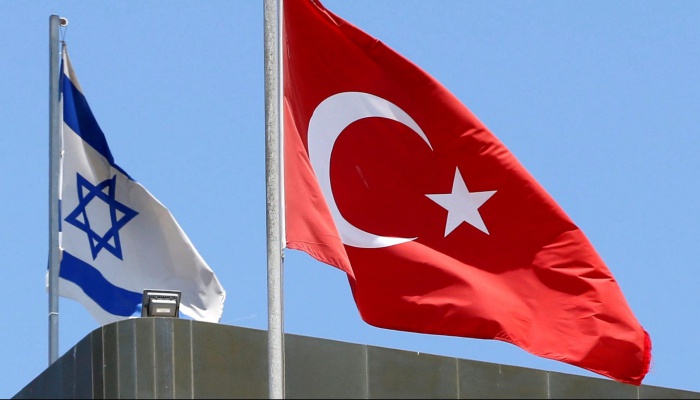The head of Turkey’s National Intelligence Organization (MİT) has been holding secret talks with Israeli officials as part of an effort launched by Ankara to normalize relations, Al-Monitor reported.
Al-Monitor’s report cites three sources speaking on condition of anonymity who confirmed that meetings had taken place in recent weeks with MİT chief Hakan Fidan representing Turkey in at least one of them, declining to specify the location of the meetings.
The report said talks were specifically aimed at upgrading ties back to the ambassador level as there has been no ambassador in either country since May 2018, when bilateral ties suffered a blow over Turkey’s reaction to Israeli attacks on Gaza and Washington’s decision to move its embassy from Tel Aviv to Jerusalem. The relations came under further strain as Turkish President Recep Tayyip Erdoğan denounced Israel’s West Bank annexation plan, vowing to prevent its implementation.
One of the sources quoted in the report said, “The traffic [between Turkey and Israel] is continuing,” without further elaboration.
Gallia Lindenstrauss, a senior research fellow at the Israeli Institute for National Security Studies quoted in the report, said there is a window of opportunity for turning the page.
Ankara worries that the incoming Joe Biden administration will be less indulgent of Turkish President Erdoğan’s flexing of military muscles, which has seen Turkey mount three separate incursions against the Syrian Kurds since 2016, send troops and Syrian mercenaries to Libya and Azerbaijan, and lock horns with Greece in Aegean and eastern Mediterranean waters, the report says.
“Both states can present it as a goodwill step for the coming Biden administration that is likely to be more interested in relaxing tensions between Israel and Turkey than the Trump administration, which didn’t push this agenda at all,” Lindenstrauss was quoted as saying.
“The calculation is that making nice with Israel will win them favor with the Biden team,” a Western official speaking not for attribution was quoted by Al-Monitor as saying.
The United States in August denounced Erdoğan’s hosting of leaders of Hamas in İstanbul, with Ismail Haniyeh, head of the Hamas Political Bureau, and an accompanying delegation among them.
The US State Department said the officials were Specially Designated Global Terrorists and that the United States was seeking information about one for his involvement in multiple terrorist attacks, hijackings and kidnappings.
Back in August Turkey threatened to suspend diplomatic ties with the United Arab Emirates, withdrawing its ambassador over the Gulf state’s agreement to normalize ties with Israel under a US-brokered deal, the first between Israel and a Gulf Arab state.
The deal made the UAE the third Arab country to establish full relations with Israel, after Egypt in 1979 and Jordan in 1994.
Looking ever more friendless and feeling the pressure imposed by Biden’s electoral victory, Ankara has reached out to Saudi Arabia, with Erdogan speaking to Saudi King Salman on Nov. 21 ahead of a G20 summit chaired by Saudi Arabia.
However, Al-Monitor quoted Ali Shihabi, a New York-based expert on the Middle East, who said: “I don’t see that mistrust of Erdogan disappearing any time soon. Not before Erdogan moderates his regional fantasies.”
Erdoğan may have relatives benefiting financially from trade with the Jewish state, Israeli Foreign Minister Israel Katz said in August 2019.
“We don’t like him, nor does he like us – and they [in the Gulf] also don’t like him, because the Muslim Brotherhood, in its extreme version in Turkey and Qatar, threatens them no less than Iran,” Katz said.
There is clear hostility between Turkey and Israel, Katz said, “but the trade continues to grow, and I said that Erdoğan – perhaps even some of his family — is involved in bringing trucks to the Haifa Port and then on to you [in the Gulf].”
Ferries loaded every day in Turkey with trucks laden with Turkish goods land in Haifa and then are driven to the Allenby Bridge, across Jordan and to the Persian Gulf countries. Since the start of the Syrian civil war, this has become the key transport route for Turkish goods going to markets in Arab countries in the Gulf.
Ankara has been scrambling to give reconciliatory messages to the US, the EU and countries in the Middle East after four years under Trump, when it enjoyed relative freedom to implement assertive policies.
NATO allies as well as EU member countries have been raising concerns over Turkey’s course of action, while countries like France and Greece have labeled Ankara as a destabilizing force.

